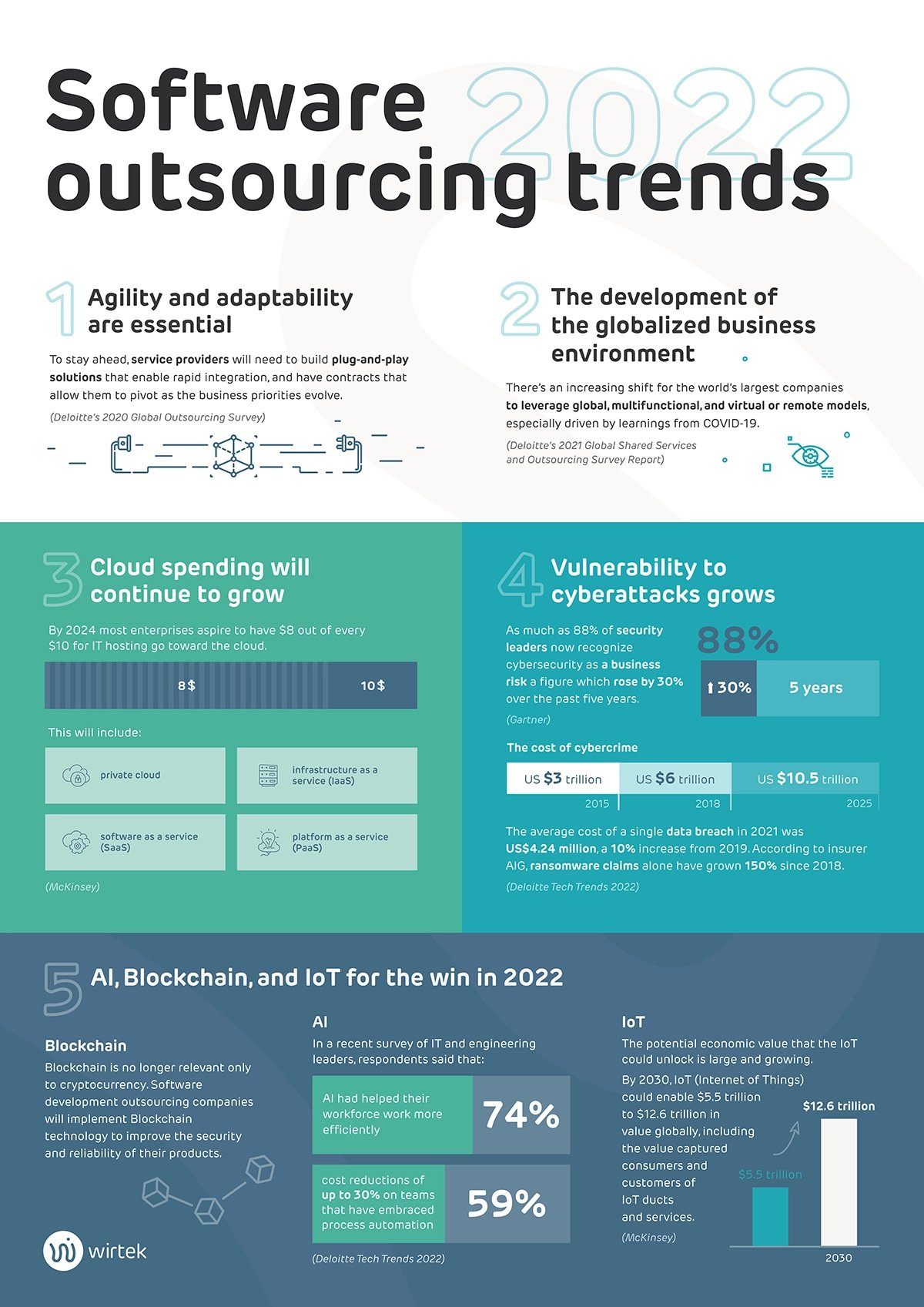2022 is looking like another year of transition towards a new normal. It’s safe to say that we can already declare “hybrid” as the most used word of the year while companies worldwide are still debating how to handle the transition between working from home and returning to the office. Given how the current labor market shifted power to employees, pre-pandemic work structures are likely to become extinct.
What does this mean for the IT outsourcing market? As remote work has been widely popularized in the past two years, outsourcing workload to a company located in another country is becoming more frequent and seamless.
Agility and adaptability are essential.
In 2021, agility and adaptability were the top skills employers were looking for when choosing an outsourcing company, and it is still relevant today.
“Changing business scenarios, heightened visa restrictions, and increasing client expectations are all creating an imperative for service providers to become more agile. Firms will now accelerate overall outsourcing as they learn to collaborate in a world where speed, quality, flexibility, and cost are more important than geography. To stay ahead, service providers will need to rethink how they provide effective remote services, build plug-and-play solutions that enable rapid integration, and have contracts that allow them to pivot as the business priorities evolve.” (Deloitte’s 2020 Global Outsourcing Survey)
The development of the globalized business environment.
In 2022 the tendency continues to point to an even more globalized business environment as companies tend to look past location barriers. The focus is on the quality of the service and the possibility to rapidly adopt new technologies.
“Service delivery models are always evolving. There’s an increasing shift for the world’s largest companies to leverage global, multifunctional, and virtual or remote models, especially driven by learnings from COVID-19. These organizations are prioritizing areas across work, workforce, and workplace to successfully further the value that shared services and outsourcing models bring: increasing efficiency, reducing costs, and driving greater business value. Apart from expanding the traditional functional scope, they are developing specialized capabilities such as analytics, reporting, digital, and enhancing the customer experience.” (Deloitte’s 2021 Global Shared Services and Outsourcing Survey Report)
Cloud spending will continue to grow.
According to Gartner, worldwide end-user spending on public cloud services is forecast to grow 20.4% in 2022 to total $494.7 billion, up from $410.9 billion in 2021, according to the latest forecast from Gartner, Inc. In 2023, end-user spending is expected to reach nearly $600 billion.
According to McKinsey by 2024, most enterprises aspire to have $8 out of every $10 for IT hosting go toward the cloud, including private cloud, infrastructure as a service (IaaS), platform as a service (PaaS), and software as a service (SaaS). Achieving that aspiration will require significant effort from both enterprises and technology providers.
Vulnerability to cyberattacks grows.
With the continuous shift to the digital environment, businesses are becoming more and more vulnerable to cyberattacks. According to Gartner, as much as 88% of security leaders now recognize cybersecurity as a business risk (not a technological one) - a figure which rose by 30% over the past five years. DevOps are responsible for introducing security processes and methodologies at every stage of the software development cycle. Cybersecurity used to be a commodity only large enterprises would afford and invest in improving. But nowadays, this is no longer a choice for small or mid-sized companies.
“The cost of cybercrime continues to climb; it’s expected to double from US$3 trillion in 2015 to Us$6 trillion by the end of 2018 and continue to grow to US$10.5 trillion by 2025. The average cost of a single data breach in 2021 was US$4.24 million, a 10% increase from 2019. According to insurer AIG, ransomware claims alone have grown 150% since 2018.” (Deloitte Tech Trends 2022)
AI, Blockchain, and IoT for the win in 2022
We picked the three areas that we think will make a giant leap this year. While crypto and NFTs are trending subjects, Blockchain is no longer only relevant to cryptocurrency. Software development outsourcing companies will implement Blockchain technology to improve the security and reliability of their products.
AI is already used in automated workflows, and more and more companies are seeing the direct impact in lower labor costs, security, and efficiency. In a recent survey of IT and engineering leaders, 74% of respondents said that automation had helped their workforce work more efficiently. Fifty-nine percent reported cost reductions of up to 30% on teams that have embraced process automation.’ Add to this noticeable increases in quality and security, and it becomes clear why 95% of respondents prioritize process automation, with 21% saying it’s a high priority. (Deloitte Tech Trends 2022)
The Internet of Things (IoT) is already in every gadget we use, in our home management systems, and on a larger scale in industry management solutions, sensors, etc. The potential economic value that the IoT could unlock is large and growing. By 2030, McKinsey estimates that it could enable $5.5 trillion to $12.6 trillion in value globally, including the value captured by consumers and customers of IoT products and services. While the potential economic value of IoT is considerable, capturing it has proved challenging, particularly in B2B settings. Many enterprises have struggled to successfully transition from pilots to capture value at scale.

Want to look back at what IT Outsourcing Trends we listed in 2021? You can find that article here.



